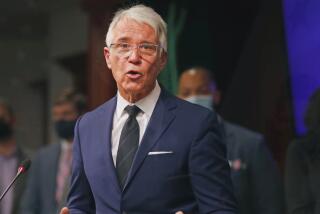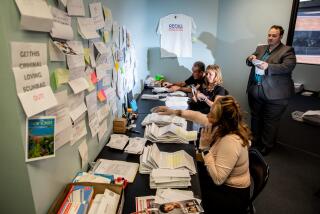Davis Allies Explore Challenge
- Share via
SACRAMENTO -- Strategists for Gray Davis conceded Tuesday that a recall election was likely and moved into full campaign mode, expressing confidence that they could convince voters not to oust the unpopular governor.
Even as they mobilized, however, Davis advisors also were researching grounds for legal action and said they might move as quickly as this week to challenge the signature-gathering process in court. Such a move, even if ultimately unsuccessful, might delay the process long enough to throw the election into next spring, when the presidential primary is expected to draw a heavy Democratic turnout.
Experts looking for ways to potentially derail the historic vote pointed to requirements in the state election law that specify those who circulate petitions, as well as those who sign them, must be registered voters. Many of the paid signature-gatherers employed by the recall campaign are professionals who move from state to state, following campaigns that hire them and pay per signature.
Davis advisors also said the petitions might be vulnerable because many were downloaded from the Internet, and election law requires that each petition specify the name of the county in which it is circulated, and that all signatures gathered must be from voters registered in that county.
A spokesman for the Davis anti-recall campaign, Taxpayers Against the Recall, wouldn’t discuss specifics but confirmed that the group is discussing various options.
“We wouldn’t be a very smart campaign if we didn’t examine all the options, just as they are examining all their legal options,” spokesman Carroll Wills said. “We are looking at everything.”
Recall proponents said they were anticipating legal maneuvers by the Davis forces.
“I would not be surprised if the governor and his supporters would stop at nothing to derail the recall, based on the tactics they’ve tried to employ in harassing the signers and circulators of petitions,” said Thomas Hiltachk, legal advisor to the recall campaign. “But I’m not aware of any grounds for a legal assault on the process.”
Davis strategists said they were prepared for a campaign and believed they could convince voters to reject what Davis will portray as a Republican-backed attempt to unseat a duly elected governor.
“We believe we have a strong message about the process, about the agenda being offered as an alternative, about the uncertainty and, if they go for a special election, the cost,” said Paul Maslin, Davis’ longtime pollster, one of those preparing for the campaign. “The truth is, we have more than one argument.”
Echoing the message of other Democratic strategists, Maslin said the recall is destined to fail once the campaign gets underway in earnest. A Los Angeles Times poll last week found that 51% of voters said they would recall Davis -- a number that Maslin and other Democrats said would weaken once an election campaign got underway.
“Initiatives that start a campaign at 50% lose 99 times out of 100,” he said.
The Spotlight Shifts
With organizers of the campaign to unseat Davis declaring a successful end to their signature drive, the spotlight in the historic political drama shifted Tuesday from California’s streets and shopping malls to county election offices and, potentially, state courtrooms.
Recall organizers have submitted more than 966,000 signatures to the state’s 58 counties, a Los Angeles Times survey of county registrars found. Forty-five of the state’s 58 counties have begun validating those signatures, with a number of counties reporting validation rates of 80% or higher, a rate that bodes well for recall supporters if they deliver the 1.3 million signatures they say they have collected.
If elections officials validate the signatures and addresses of 897,152 registered voters who signed recall petitions, Californians will decide Davis’ fate in a special election later this year or next March’s scheduled election. The number of required signatures -- 12% of the votes cast for governor in the 2002 election -- is set by the state Constitution.
The likelihood and timing of an election will be determined in the next several weeks as county officials pore over thousands of petitions turned in by recall proponents.
While a number of counties surveyed by The Times said they expected to complete the validation of signatures by July 23, the next deadline counties face for reporting the number of verified and unverified signatures to Secretary of State Kevin Shelley, several said they might not complete work until August. Among those was Los Angeles County.
The timing is key; according to analysts, if the count is delayed until late August or September, the election could be consolidated with the March presidential primary. That is widely perceived to be helpful to Davis, since that election is expected to draw a strong Democratic vote to help pick the party’s presidential nominee.
Recall supporters say they fear delaying tactics by Shelley and even some county election officials with Democratic sympathies as the campaign nears the ballot, a circumstance that none of the previous 31 attempts to unseat California governors has ever achieved.
But county election officials around the state said they were working as fast as they could in the face of budget constraints and other duties unrelated to the recall.
Under provisions of the state election code, the counties are required to validate a 3% random sample of the batches of more than 500 signatures submitted for verification. In the case of Los Angeles County, which reported having slightly more than 125,000 unverified signatures on hand as of Tuesday, that would require the validation of only 4,167 signatures, which are randomly selected by a computer program.
It can take two to five minutes to verify the address and signature of each person signing a petition, and sometimes longer if the signatory’s handwriting is poor or the address is incomplete, said Conny McCormack, Los Angeles County election registrar, who said she has assigned five or six people to examining the recall petitions submitted in the county.
Registrars Are Busy
Steve Rodermund, Orange County’s interim registrar of voters, said he had more than 156,000 signatures on hand in 32,000 pages of petitions and cover letters -- stacks of documents at his offices.
Of the more than 100,000 signatures already checked, Orange County has found a validation rate of more than 83%, Rodermund said.
In Orange, as well as other counties, that validation rate is multiplied by the total “raw” count of signatures received and the resulting sum is reported to the secretary of state as the number of valid signatures.
Orange County expects to complete its count by a July 23 deadline for reporting the latest results to the secretary of state.
It took two members of Rodermund’s staff three days to verify about 1,950 signatures, or 3% of a single batch of 65,000 signatures, he said.
“We’re not doing anything out of the ordinary to more quickly get these out,” he said.
The verification of signatures is just getting underway in some counties, such as Sacramento, which have experienced computer glitches. Sacramento County election officials have had to reprogram their computers to conduct the random samples of signatures by batches, said Alice Jarboe, who is supervising the signature validation operation for the county.
Times staff writer Allison Hoffman contributed to this report.
More to Read
Get the L.A. Times Politics newsletter
Deeply reported insights into legislation, politics and policy from Sacramento, Washington and beyond. In your inbox twice per week.
You may occasionally receive promotional content from the Los Angeles Times.










